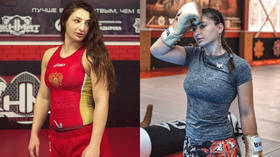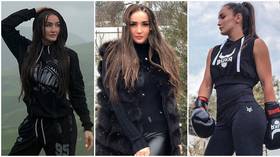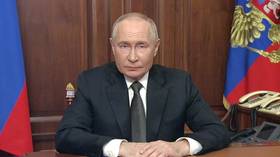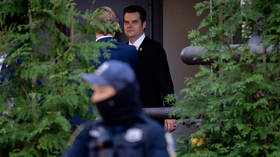'Shevchenko is better than some men': UFC's Liana Jojua talks ambitions after impressing on Fight Island (VIDEO)
Georgian UFC flyweight Liana Jojua says she will attempt to rise to the top of the sport on her own terms but has cited the likes of Valentina Shevchenko to prove the heights of what can be achieved.
Jojua, 25, picked up a first-ever win in the UFC octagon earlier this month on Fight Island in Abu Dhabi, submitting Romania's Diana Belbita in the first round of their contest with an excruciating armbar which left Belbita howling in agony.
For Jojua, it was the perfect response to a debut defeat against Sarah Moras at UFC 242 back in September – a bout which took place at bantamweight and during which Jojua had seemed heavily outsized by her Canadian opponent.
Also on rt.com 'Shewolf submission!' Liana Jojua scores 1ST EVER UFC WIN with 1st-round armbar on Fight IslandSpeaking to RT Sport on Fight Island, Jojua said the nature of her victory over Belbita had been a mixed blessing as she had wanted to showcase her skills for longer than the 2 minutes and 43 seconds it took her to finish the Romanian.
"To be honest, I thought I’d have a chance to show my skills more but everything ended quickly. There were two punches in the standups then we clinched. I took her down and then everything ended. I didn’t get to show myself but I’m glad the fight ended quickly and painlessly for me, but unfortunately not so for my opponent," said the Tbilisi-born fighter.
Jojua gained extra attention on social media for the brutal nature of the submission, which left Belbita screaming in pain. The Georgian nicknamed 'She Wolf' said she had heard her rival's arm making a disturbing crack as she locked in the move.
"When I had her in an armbar, I was hoping she’d tap, but she didn’t. She tried to break it, get her head out. There were some gaps in the armbar," Jojua said.
"When I wrapped my legs around for the second time I thought I definitely had to end it so I stretched out. When I did that I heard the crunch of her arm breaking.
"She didn’t tap, she screamed in pain. I let her go and the referee ran up to us. I didn’t want to win that way, but my opponent was tough and didn’t want to give up."
Having dropped down to flyweight from bantamweight, Jojua said she felt firmly at home in the 125lbs ranks.
"It’s a huge difference, I noticed it right at the weigh-ins when I shook my opponent’s hand.Her hand wasn’t as big as my previous opponents’. I thought, ‘Why did I stay at bantamweight and fight big, strong women? The difference between those women and the woman that’s in front of me is huge,'"Jojua said.
"After that I decided never to fight at bantamweight again and stick to this new division... I’ll definitely stay at flyweight, but next time I’ll start my weight cut two months before the fight because I felt horrible at weigh-ins, I nearly passed out.
"Maxim [Grishin] and my trainer Burak dragged me everywhere because I had no strength. They took me from place to place, wrapped me up, brought me ice because I was numb, I felt horrible. I barely made weight, so I think it’s best to have more time."
As she explained to RT Sport, Jojua's pre-fight difficulties were not confined to the weight cut as she also saw her luggage get lost by the airline en route from her base in Istanbul, as well as some of her team being unable to attend due to Covid-19 restrictions.
Ultimately, however, the experience was a successful one now that Jojua has a first UFC win under her belt – and as for what comes next, 'She Wolf' said she was realistic about her potential rise in a division which has the formidable Valentina Shevchenko as its apex predator, but added she would try to do things firmly on her own terms.
"Of course everyone wants to see fights as often as possible, but I don’t want to fight all the time because I had a hard time getting ready during the coronavirus pandemic," Jojua said of her contest in Abu Dhabi.
"I had three months of strict isolation, then I went to the gym and had one month to prepare for the fight. That’s barely any time at all. I want a good training session, have good sparring partners and train with my coaches.
"I don’t want to prepare for every fight the way I prepared for this one. I was asked if I want to fight in October, and I’d love to but I know that because of coronavirus I can’t go somewhere and put a good team together.
"I don’t want to fight just for the sake of, I want to show the best version of myself. I put a lot of effort into dropping down to flyweight and being in shape for this fight, one month is not enough for a person who was quarantined for three months.
"Everyone is waiting for my next fight but I’m focused on what’s best for me. It’s good that Dana White pays attention to me, but I have to put myself first because it’s my career. If my career goes south then nobody will care about me, so I’m doing what’s best for me."
Jojua was born in Georgia and spent her early childhood there before moving to Moscow, where she spent her school and university years. She has since spent time back in her homeland before moving to Istanbul, where she is currently based.
"Russian women that end up in UFC and other good promotions do it because of their achievements, local promotions don’t help them build a career," said Jojua, who became the country's first official women's MMA title holder by defeating Marina Mokhnatkina in a Fight Nights Global bout back in 2018.
"I think that has a lot to do with the level of competition. And as long as we have this mentality that a woman should be in the kitchen… while we have this mentality that level will stay where it is.
"I believe that everyone should do what they want as long as it doesn’t interfere with what others want, then you should do what you love no matter your gender.
"Everyone was surprised that my club Akhmat was helping me, but those guys treat me like an athlete, not just a woman. They treat me professionally, they pay attention to me and help me train. Thanks to their professionalism I get good results.
"If you go to a gym and they say ‘Oh she just a girl’ you’re not going to have much growth."
Jojua said Kyrgyzstan-born star Shevchenko is an example of a female fighter who could hold her own even against some of the men in MMA.
"People are weird - they can say horrible things one day then praise you the next. They change their minds all the time. I think that if a woman acts appropriately and has good fights there’s nothing to talk about," Jojua said.
"They show with their actions that they’re no worse than men, that they’re just as professional. Valentina Shevchenko is an example of that, she gave her whole life to the sport, she’s a professional.
"I think of her as a robot because her every more is calculated and refined since childhood. How do you think of her as just a woman? She’s a true professional, she’s better than some men.
"Her gender has nothing to do with it. It's important to respect everyone. There are a lot of good fighters besides her who put in blood, sweat and tears. People see that and their opinions change. You just have to act and people will change how they talk, that’s the main thing."
Now firmly on her own path in the UFC, if Jojua can emulate even part of what Shevchenko has achieved in the flyweight ranks, she will know that she has more than made her mark.














